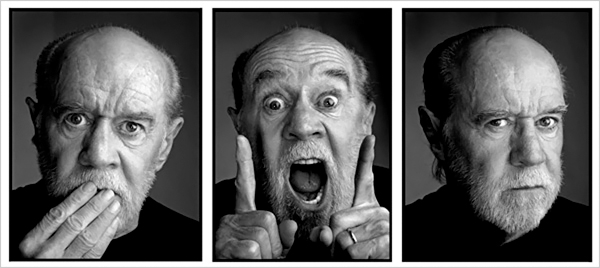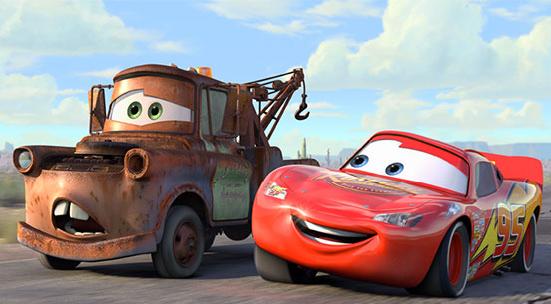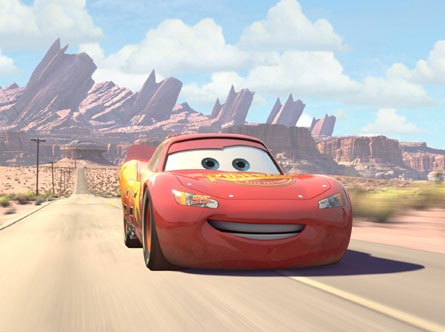
Tag: George Carlin
Middle of the Road.

First, a disclaimer: While I’m always up for a road trip, for whatever reason — and despite growing up next to the Darlington 500 — I never really acquired an appreciation for NASCAR, or for car culture in general. Still, I’d say the review consensus on Cars, Disney and Pixar’s recent foray into CGI entertainment for the red states, is basically on the money: While not nearly a classic on the order of the Toy Stories or The Incredibles, this visual marvel does make for an enjoyable summer jaunt, even if it feels more than a bit by-the-numbers for most of its run. The movie hits all its beats (albeit somewhat languidly) and kids, particularly those of the Hot Wheels persuasion, are sure to love it — John Lassiter & co. don’t drop the ball here by any means. Still, one can’t help but get the lingering sense from Cars that the tank on Pixar’s incredible creative ride may be in need of a fill-up.
In terms of story, Cars is basically Days of Thunder meets Doc Hollywood: On his way cross-country to the most important race of the year, Lightning McQueen, a hotshot young rookie racer on the Piston Cup circuit (Owen Wilson, whose trademark whine starts to grate after awhile), makes an inadvertent pit-stop in Radiator Springs, a sleepy little town languishing on a forgotten stretch of the Mother Road, Route 66. Impounded for reckless driving and forced into community service by the gruff town elder, a Hudson Hornet (Paul Newman), McQueen finds himself having to spend crucial race-prep days repaving the village thoroughfare. But, fret not — as it turns out, the self-absorbed, vainglorious McQueen may just learn a thing or two about life and the true spirit of racing from the locals, which include, among others, a redneck tow truck (Larry the Cable Guy), a Ferrari-loving Fiat (Tony Shalhoub), a hippie VW bus (George Carlin) and, if you’re into that sort of thing, an alluring Porsche lawyer (Bonnie Hunt). All well and good, but can McQueen still make the big race in time, defeat his mustachi-grilled nemesis (Michael Keaton), and win the glory and sponsorship he’s been so desperately seeking?
Take a guess. Still, one shouldn’t fault Cars for being somewhat pat — it is, after all, a kid’s movie, and, as the film points out, the journey should matter more than the destination anyway. That being said, despite its hyperkinetic opening and for all its many breathtaking visual flourishes (note particularly both the wide-angle western landscapes and the eye-popping neon of Radiator Springs at night), Cars definitely bogs down for most of the middle laps, amid several interminably long stretches of rote character development. (By the way, as the mind wanders while these animated cars talk to each other in been-there, done-that platitudes, it occasionally becomes hard not to see them instead as weird immersion tanks for floating eyeballs — you’ll see what I mean.) To be fair, by the standards of most animated films, Cars is still in a class above the rest. But, given that this is Pixar we’re talking about, it’s hard not to expect a little more ingenuity throughout. (Also, while it may be ludicrous to discuss issues of political economy here, Cars wants it both ways: Apparently small-town folk are more wise and virtuous than their city-car contemporaries, but Radiator Springs’ major beef is that they’re no longer a big city. Ah well…I guess The Incredibles had similar problems.)

The Cars that go Boom.
AOL Moviefone gets the new trailer for Pixar’s Cars, and it appears to be one part Ricky Bobby, one part Doc Hollywood…and far afield from Toy Story or The Incredibles.
Ticket to Ride.
The new teaser for Cars is online. I’m not really feeling it, but after the Toy Storys, Finding Nemo, and The Incredibles, I’ll give Team Pixar the benefit of the doubt.
The Worst Joke Ever.

“You see there’s this cat burglar who can’t see in the dark…” No, not that one…The Aristocrats, which I heard told several times over in the first leg of my Labor Day movie marathon. By now, you’ve probably heard the setup for both the documentary and the joke…but, just in case, a gaggle of famous comedians tell their respective versions of a crusty and filthy old vaudeville yarn involving a “family act” audition in an agent’s office. The name of the act, as the punch-line tells us, is “the Aristocrats” (or occasionally “the Sophisticates” or “the Debonairs.”) The act itself varies in the telling, but generally includes lots of micturition, bowel-loosening, vomiting, sodomy, incest, bestiality, and sundry other vile depradations you usually can only see on cable TV. And the funniness of the joke depends a good deal on the talents and twisted imagination of the teller. All in all, I’d say the movie is funnier than the joke and worth catching (if you’re not easily offended), but it’s nothing you need to rush out and see in the theater.
In all honesty, be it due to exposure to Deadwood, Grand Theft Auto, or the school bus, I found most iterations of the joke less transgressive than they were just repetitive. While some comedians bomb with the joke (Taylor Negron, Lisa Lampanelli, David Brenner, and Emo Phillips, to whom the years have not been kind), others seem to have never heard it (Chris Rock, Eddie Izzard), and still others hedge their bets (Paul Reiser, Drew Carey), I’d say up to 85% or so of the tellers just seem content to swim around in the same sex-and-defecating pool like demented eighth graders afflicted with the giggles. Sick-and-twisted-funny, sure, but not over and over again (which is why the movie wisely begins throwing in a mime version, two magic versions, and other more idiosyncratic iterations after awhile.)
Still, some comedians do shine with the material. George Carlin and Bill Maher in particular offer sound insights into the joke’s past and present. (As Maher and Lewis Black note, the Aristocrats stand in increasing danger of being overtaken by Reality TV.) Martin Mull, Carrie Fisher, “Christopher Walken,” and Sarah Silverman deserves points for telling roundabout or slightly off-kilter versions of the same sordid story. And Bob Saget gets a gold star for performing a bizarre career self-immolation and running with easily one of the most inventive and disgusting versions of the joke…no more America’s Funniest Home Videos, for him, I’d wager. (Jason Alexander’s isn’t bad, either.)
Much is made of a cathartic public telling of the joke by Gilbert Gottfried soon after 9/11, but, frankly, it doesn’t come across. In fact, in a way that version belies the problem I had with most tellings of the joke. By avoiding the 9/11 tragedy to focus on ungodly shagging and bodily fluids, Gottfried wasn’t being transgressive — he was playing it safe (and, to his credit, uniting the comic world with a joke they all shared, which was more likely his intention.) Still, Jeffrey Ross’ riposte to Rob Schneider that night — “Hasn’t there been enough bombing in this city?” — seems closer to the anarchic, tasteless, subversive, and shocking spirit the Aristocrats needs to be anything more than an endless litany of fart jokes. Different strokes for different folks, I know. But, given that I was watching the film while the Aristocrats in office bumbled their way through the tragedy of errors that was Katrina, I just found myself thinking that, in today’s dark times, the strictly vulgarian canoodling of most versions of the joke seemed, well, quaint, out-dated, and devoid of edge…in some ways, even tame, or as tame as a joke involved incest, bestiality, and sodomy can be. (For their part, the masterminds behind The Onion are, I think, the only comedians to broach politics in the film.)
Not to miss the forest for the trees, though, I wasn’t really brooding on this during the film so much as laughing at every third or fourth version of the joke…which, if you think about it, isn’t all that bad a hit rate. So, check out The Aristocrats on cable if you don’t mind the dirty-talk…but, please, don’t try this at home.
